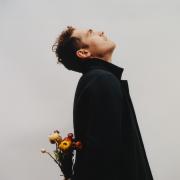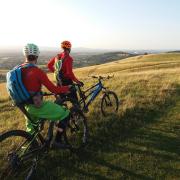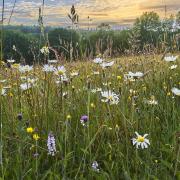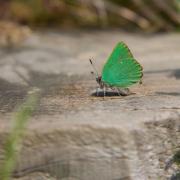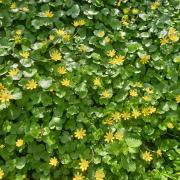Westonbirt Arboretum’s sensory guide Mike Kelly encourages us to open our ears to the blackbird’s lilt, breathe in the scent of green things growing, and feel the rustle of breeze in the trees’ canopy
I’m standing with my eyes covered. (Strange how simple the action, yet how alien the feeling. Pretty much the last time I did this in a public place was aged 10, trying to pin a tail on a donkey).
And just like that: in a non-flash, the world has disappeared.
The blue above – striated with white plane-trails and scuddy clouds – is no more. No greens, nor browns, penetrate my eyelids. Not for me the shocking pink of a rhododendron; nor the splash of colourful clothes of the small, suddenly unknowable, group around me.
I surprise myself with a feeling of vulnerability. Unable to interpret a world that, a few seconds ago, had felt so jaunty and conquerable.
And yet…
‘Waggle your feet,’ Mike Kelly, our Westonbirt Arboretum guide, gently instructs us. Not as weird as it might sound. (Honestly, he has his reasons…)

‘Experience what you can touch. If you waggle your feet, you can tell if the ground is soft or hard; flat or slope-y.’
Almost without my telling them so, my brain cells move from their obsessive sight-based sensing to something more subtle. Yes, they tell me, casually - as though I’m the one fixated on the visual - the ground you are on is soft and grassy; flat and safe.
‘Now feel the gentle breeze from your right,’ Mike continues, in a voice so hypnotic, he could give Derren Brown a run for his money. ‘Listen to what’s around you. Behind you is traffic; all around is the gentle rustle of breeze in the canopy of the trees.’
He’s right; as I begin to relax, my other senses leap into action. Up in the sky is an aircraft. There’s something mechanical in front, in the distance – farm machinery, maybe? A bee buzzes past like a jet teasing a surveillance plane.
And birdsong; lovely birdsong; in waves; in layers. The high cheery rhythm of a robin close by; the rich, pretty lilt of a blackbird whose conversation (if only I concentrated hard enough) would turn into words and phrases I could reply to. Further afield, the insistent trill of a wren. And, all around, the croaky Lemsip caw of Corvids.
(What I’d have missed – I think, in surprise – had I been able, at this moment, to see!)

Mike hasn’t seen the world in all its glory for decades now.
‘People make all sorts of assumptions about any minority groups. I still come across people who think that my wife Wendy and I live in a bungalow because I can’t manage stairs; or that I can’t hold a hot cup of tea.’
He makes us laugh. ‘We went to speak to a local group of Beavers a few days ago – six or seven years old. One of the little boys asked, ‘How long have you been blind?’
‘I said, ‘Forty years’.
‘He said, ‘If I’d been blind that long, I’d prefer to die.’ Not really a philosophy I subscribe to.’
And Mike wants to show us (Hmph. My very metaphors are unintentionally sight-based) exactly how and why his own philosophy is so different as he takes us round the magnificent arboretum.

ROBERT HOLFORD, whose home was once the impressive mansion across the road (now occupied by Westonbirt School) began planting this arboreal paradise back in 1829: the embryonic age of the intrepid gentleman (and the occasional adventurous lady) plant-hunter, who’d travel the globe in search of exotic species to ornament gardens and astonish guests.
Holford – and, later, his son, George – found an interesting range of soils (from limey and alkaline to pockets of sand) on their grounds; and they made the most of them, establishing fantastical, beautiful, charismatic plants and shrubs that – yes – created sights to surprise and delight the eye.
But – as Mike is busy showing us – a delight to the eye is often an overlooked thrill for other senses.
He leads us through a narrow shrub passage which (I’m beginning to get this) magnifies our footsteps from light tread into stomps; into a space that opens like a cathedral. I notice the crunch of fir cones underfoot; the chill of the close trees, giving way to the beneficence of sunlight. And, suddenly, we’re surrounded by full moon maples, dawn redwood, and a rare Kentucky coffeetree: this is Victory Glade, named for the glorious end of the 19th century Crimean War. (That went well.)
We all have our reasons for being here, in a small group, on this Sensing Nature guided walk. Among us are Brett and family, on holiday from Kent. Brenda is another - she loves walking and is regularly to be found leading hikes around the area. Mark Corcoran is Nailsworth’s Poet Laureate; at one point, as we stand by a weeping holly, he reads us a poem about watchfulness and grief. Strangely, it’s a beauteous poem about the blindness of the sighted. A poem about the large weeping willow in the centre of Nailsworth where he lives: ‘It was there for years before I spotted it,’ he says. ‘And, once I had spotted it, I thought: How could I not have seen it!’

There’s Paula – a puppy-raiser for Guide Dogs for the Blind; she looks after the pups until they’re ready to go on to the next stage of their vital training. ‘It’s horrible letting them go. Skip is in Cardiff; he left three weeks ago.’ She almost gulps. ‘But it’s wonderful to see them working.’
Nicky, Mike’s guide dog, is a case in point. ‘Not that she’s interested in trees,’ Mike clarifies. ‘She’ll be counting squirrels.’
Paula has brought along her three-year-old grandson, Rory, who adds charm and uninhibited joy to the proceedings. As well as no-extra-charge noises. ‘Crisps,’ Paula identifies at one point, as we stand in otherwise-silence.
There’s no doubting – despite Nicky’s semi-commitment to the theme – that Mike is a superb guide. He had good sight until he was 30, he tells us. And then, out of the blue – as it were – his vision began blurring; he experienced wavy red lines. The loss of vision came as he took his final RIBA exam, to become an architect.
A consultant diagnosed his condition as familial retrolental fibroplasia; then Mike’s family was tested and the ‘familial’ was dropped. As it was, ‘retrolental fibroplasia’ was merely a complicated way of saying, ‘Baffled’.
‘They don’t know what it is or why it happened and I never got a prognosis; so I didn’t know whether I would lose my sight or not – but obviously I did. Not even light-perception.
‘And although I’ve not seen anything for 40 years, I still dream very vividly in form and texture; I dream of buildings and people and cars; desks, work. I still ‘see’ things.’

He gets us to cover our eyes again, and to breathe in – short, sharp sniffs.
‘The lovely scent of green things growing. I can navigate quite well using smell. In bigger towns like Cheltenham, a lot of shops have very distinctive smells. Boots the chemist does. Clarks does. Greggs. I try to avoid going close to Lush because it’s overpowering. Smell gives a sense of place.’
We test distance by listening to receding calls; we run our hands over knobbly, rotting, mossy trunks. Trunks of dead trees, latticed like a pork pie. Living trees that feel as hard as iron; others that sound hollow when you tap.
As I sightlessly feel my way along one fallen tree, I blunder straight into Mike.
‘Oops, sorry!’
‘No, it’s good. It proves you had your eyes closed.’
‘I did. It’s kind of nerve-wracking.’
‘My first time out with a guide dog was terrifying.’
I REPEAT: He’s an amazing guide himself, is Mike. And not just for the arboretum; for life, I guess.
He worked for the county council for years; then for GCHQ for more than two decades.

‘Wendy and I go to concerts: folk, classical; walk dogs; meet friends; go away when we can. I am a guide-dog speaker and raise funds for charity.
‘I’m a bit limited with what I can do physically but, 10 years ago, I joined Nailsworth Town Council in a bid to give back to the community. I’m now town mayor.’
I mean: is it OK to say this? That this walk has opened my eyes to so many things? To so many things that aren’t my eyes.
Like the sound of Rory cracking twigs, and laughing as he jumps off a fallen tree. Like the scent of the hairy bark of a western red cedar – pencil shavings – and the pineapple smell of its leaves.
And how – when Mike asks us to describe a tree for him – I realise that the brown of a drooping juniper trunk is not brown at all. It’s hazel; it’s a run of dark treacle; it’s streaks of green like seaweed fronds streaming from the rising head of a mermaid.
‘Shadows from the sun behind and shadows dancing on the ground: butterflies above me,’ says someone else.
We’re at our final stop: a clear view of the downs in front, yes. But – more significantly now – the feel of playful air wafting over, with no trees to disperse it.
‘We’re going to capture a memory,’ Mike tells us. ‘The lovely warm breeze; the sun on your face; the clean, fresh smell.’
Birdsong; the distant rustling canopy; a low buzz of insects; and an insistent chumble.
‘Rory again,’ Paula says. ‘He’s finishing his crisps.’
• Sensing Nature guided walks are held every second and fourth Friday of the month until the end of September, beginning at 10.30am. For more information, visit forestryengland.uk/westonbirt/sensing-nature-walks
• Westonbirt, The National Arboretum, is near Tetbury: GL8 8QS






